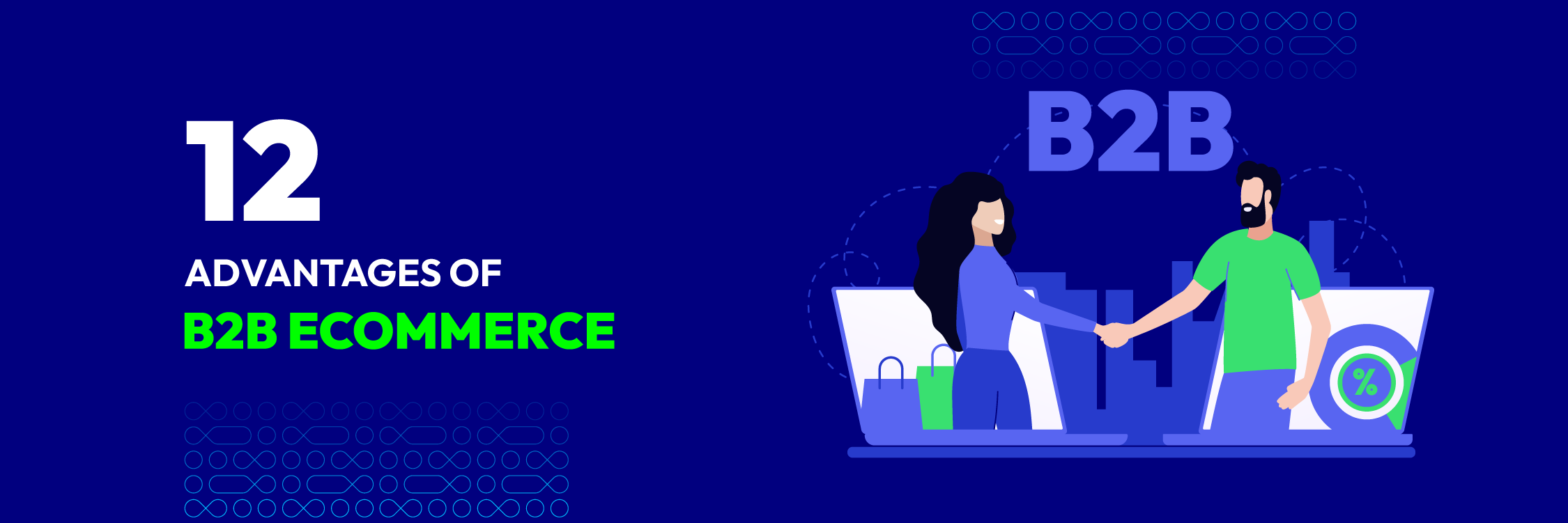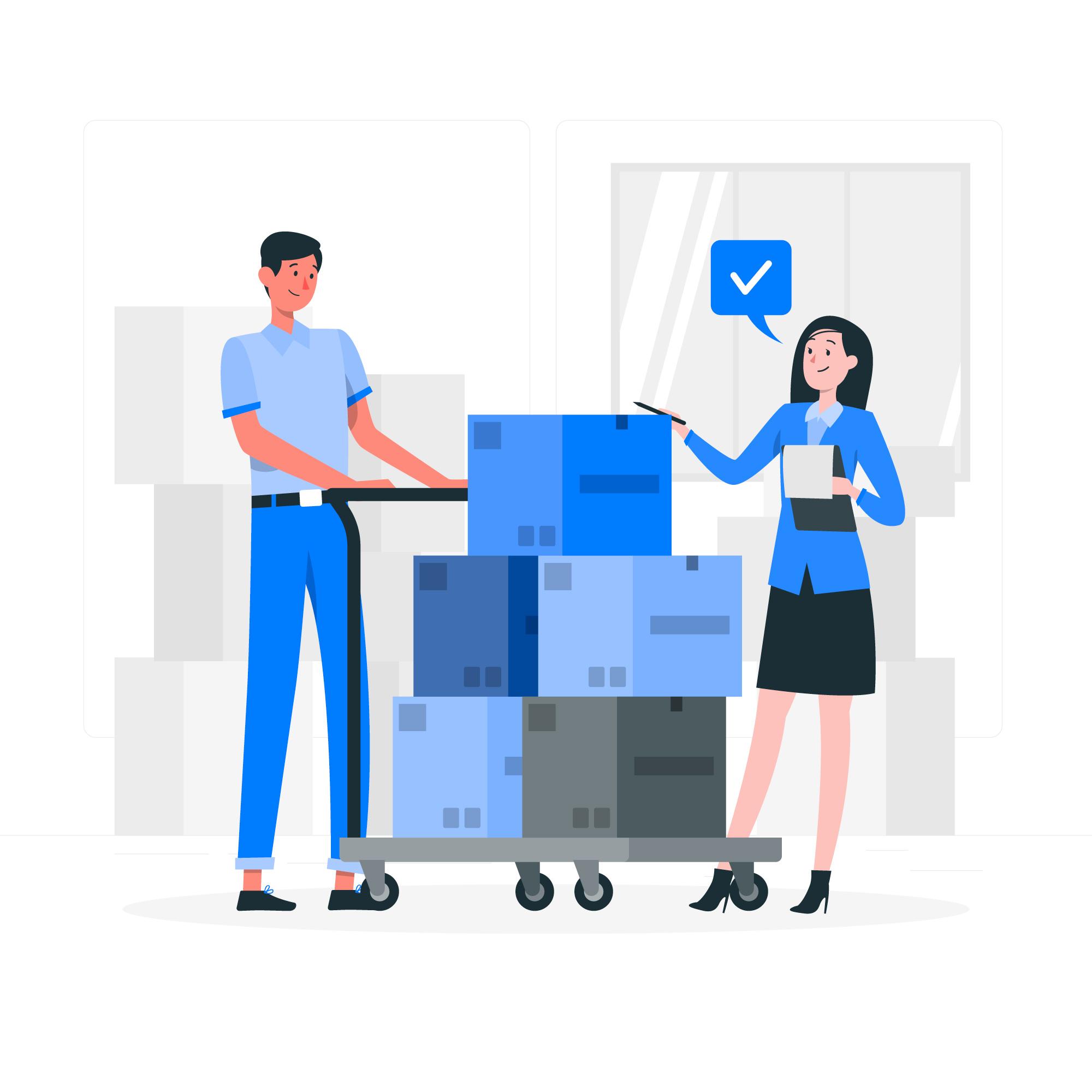12 Advantages of B2B Ecommerce: Boosting Business Growth
Summer Nguyen | 08-28-2023


The Most Popular Extension Builder for Magento 2
With a big catalog of 224+ extensions for your online store
B2B Ecommerce solutions have the power to revolutionize corporate operations.
As the B2B sales landscape increasingly shifts from traditional outbound methods to online inbound platforms, businesses must adapt to meet customer expectations and stay competitive.
In addition to enabling online product purchases for customers, there are many advantages of B2B Ecommerce, such as increased sales, enhanced efficiency, and access to new markets.
Let’s dive in to discover all the positive aspects of business-to-business Ecommerce and how they can make a company develop in the long run.
What is B2B eCommerce?
B2B (business-to-business) is a type of electronic eCommerce. It refers to the process of marketing and selling products between two businesses online. B2B eCommerce involves transactions between a manufacturer and a wholesaler or a wholesaler and a retailer through an online sales portal. The goal is to expand customer reach and reduce cost-to-serve to increase business revenue.
The advantages of B2B eCommerce
1. Raise brand awareness

Increasing brand recognition is the most important advantage of B2B Ecommerce.
Creating brand awareness can be a challenge for businesses that exclusively sell Directly To Consumers (DTC). Opting for B2B channels, such as wholesale, provides an opportunity to expand brand recognition significantly. Wholesale partners purchase your products at reduced rates and take on the responsibility of promoting them on your behalf, showcasing your product packaging in their channels.
Consider Peloton, for instance. Initially focused on direct-to-consumer sales through its online store, this fitness equipment company changed its strategy and expanded operations to cooperate with a wholesale segment. Notably, Peloton’s products are now available in various Dick’s Sporting Goods stores across the US.
Transitioning to B2B Ecommerce empowers you to heighten brand recognition by tapping into the broader market on a larger scale. An online storefront enables B2B buyers to self-serve, making your products more visible to the general public and amplifying brand recognition.
2. Reduce B2B marketing costs

There are many B2B Ecommerce advantages, but the benefit that most people are concerned about is properly cost saving.
With DTC, the only way to get people’s attention is to spend a lot of money on advertising and marketing. This can be a dangerous game. You may lose a huge budget and gain nothing.
Especially after Apple released iOS 15, it got harder for merchants to detect customer action and control the ROI (return on investment) of marketing campaigns. Similarly, when Google stopped using third-party cookies, the price for paid search ads increased by 15% from the second to the third quarters of 2021, increasing the game difficulty even more.
On the other hand, B2B Ecommerce simplifies marketing for merchants since they don’t need to spend on ads or campaigns. Their partners will handle all brand promotions instead.
The way of marketing to B2B buyers is significantly different from DTC marketing. Business buyers find personalized account-based marketing most effective. Selling directly to other businesses individually is more cost-effective than promoting to a broad audience through free social media platforms - a pie that many people already had a piece.
3. Reduced operational costs
Another great advantage of B2B Ecommerce is that this model naturally leads to lower operational costs. Selling large quantities in a single order requires fewer labels and shipping materials, reducing costs compared to individual sales.
Additionally, B2B buyers prefer self-service options when purchasing online, saving costs and time. A self-serve B2B Ecommerce platform allows buyers to purchase without exhausting resources. It gives your team more time to do other tasks that help improve the brand, like giving marketing advice, building customer relationships, analyzing their insight, searching for upcoming trends, etc.
With Shopify Plus, for example, a single Ecommerce backend handles both B2B and DTC storefronts. This fantastic feature eliminates the need for separate platforms, offering real-time inventory tracking, contextual pricing, and personalized payment terms.
4. Minimize customer acquisition costs
Acquisiting customers become cheaper and more profitable with B2B since the way it works doesn’t require spending money on marketing like mentioned above.
Let’s examine Bathworks - a merchant used to start changing to B2B by walking into a retail store and making a pitch about the brand’s product. Bathworks successfully convinced them to carry their products afterward; all it took was just the time to present the idea. This success brought the brand many large orders from the retailer. This B2B approach isn’t easily scalable for DTC-only brands.
Shaunak Amin, SwagMagic’s co-founder, and CEO, emphasizes that B2B offers scalable revenue opportunities. To effectively cater to a specific niche, a multi-brand strategy can be employed, expanding product offerings to fulfill diverse business needs. This comprehensive method establishes businesses as one-stop shops, outpacing competitors and maintaining low customer acquisition costs.
Shaunak also highlights that the approach involves targeting the same customers with a distinctive sales strategy, positioning your business as a comprehensive one-stop solution. This strategy helps keep customer acquisition costs low and boosts their long-term value, presenting an avenue for Ecommerce businesses to excel within their specific niches.
5. Higher order value and volume

The key distinction between B2B and DTC customers lies in their purchasing patterns, both in terms of volume and frequency.
Unlike individual buyers, business purchasers acquire products in bulk. Maria Boustead, the founder of Po Campo, said that their B2B platform facilitates high-volume orders, a contrast to the B2C site where customers usually make smaller purchases.
Moreover, B2B buyers exhibit more frequent purchasing behaviors, particularly when the ordering process is streamlined through a user-friendly B2B Ecommerce website. It’s common for them to place recurring orders in significant quantities, whether daily, weekly, or monthly.
This behavior differs from consumer segments like fashion and apparel, as individuals rarely have enough income to buy brand-related items frequently.
Related Post: Guide to Boost Sales with B2B Company Accounts Magento 2
6. Analyze store performance
Another outstanding point in the 12 pros of B2B online selling is the ability to evaluate store performance with modern technology.
B2B Ecommerce offers an excellent platform for companies to launch extensive analytics campaigns. Thanks to Ecommerce, businesses can conveniently measure and analyze marketing events, sales efficiency, product mix, inventory turnover, customer sales performance, interaction, etc. While Google Analytics helps Ecommerce track necessary information, utilizing analytics with your ERP provides even more valuable data with practical insights.

Google Analytics 4 for Magento 2
A clear insight into shopping and behavior of customers with 5 advanced reports
Check it out!7. Predict revenue
In B2B business, people often buy from you for a long time. You don’t need to keep getting new customers because if your product is good, they’ll stick around for years. This advantage of B2B Ecommerce can undoubtedly make the model an excellent choice.
This kind of loyalty brings you a steady income. Unlike DTC businesses that can be affected by things like economic downturns or seasonal changes, B2B businesses usually get regular orders to serve their own customers. This means you can predict your money flow better and plan for growth more accurately.
Brian Lim, who started INTO THE AM, explains that B2B businesses usually have fewer potential customers than B2C businesses because of the type of products they sell. However, he also notes that these customers often keep coming back, buying the same things regularly. For Ecommerce B2B businesses, this repeat business can be their main revenue source.
Brian also adds that B2B businesses usually have long-term customer relationships. This connection helps build trust and loyalty over time because they really understand what the customer needs.
8. Enhance efficiency and productivity

Running B2B sales offline is not easy. A regular B2B company would need a salesperson to build relationships, write orders by hand, make invoices, and remind customers about payments.
However, all the above issues will disappear after transferring to online businesses with various benefits:
- Decrease mistakes: Use workflows to automate the whole B2B sales process and reduce manual errors, meaning fewer chances of sending wrong products, billing mistakes, or forgetting payment reminders.
- Increase sales options: You can expand your B2B sales like DTC sales by adding features like upselling and suggesting other products. This lets you make more money from current customers without your sales team working extra hard.
- Fasten orders: Wholesalers can order anytime online, and your warehouse team can pack and send orders more quickly. This kind of smooth process makes customers want to order again.
- Make better choices: By connecting sales, products, and shipping data, you can see the whole picture and make smarter decisions. If you use one system to manage both B2B and B2C orders, it’s easier to know what to stock and avoid having too much or too little.
9. Shorten international delivery time

Having an online presence makes your business global. You can start in new places using one website. But, in real life, dealing with different countries can be hard and costs a lot, especially when it comes to delivery. It may take weeks to ship a package from your country to a customer living halfway across the earth, and the fee might be even higher than the order itself.
So, try B2B instead. Why don’t you let your foreign customers handle the delivery? Let’s say you’re a brand from the US. You can work together with European B2B sellers. Instead of sending small orders to individual European customers, you can send a big order to your sellers on a regular basis. This strategy helps save a lot of time and shipping costs. Your partner customers will take care of delivering your products.
This method worked very well for Vuori, a sportswear brand. They expanded to seven new countries using B2B. Even Glossier, a popular brand, started selling wholesale. To investigate on other successful B2B cases, please read our blog here.
10. Expand across multiple sites
Recognizing that people don’t follow a straight path when shopping nowadays, it’s crucial to give your customers a seamless experience with a B2B Ecommerce platform. B2B buyers often switch between devices and platforms while looking for what they want.
With a good B2B Ecommerce platform, creating specialized websites for different channels or partners is simple. This means that you can offer websites for distributors or important clients that carry both your and their branding. You can also have sites for different countries in their languages and currencies with suitable content and appearance.
11. Stay competitive
Staying competitive is also one of the most crucial advantages of B2B Ecommerce that decides whether a company can survive.
Nowadays, more B2B customers are moving to buy online, so you need to keep up or risk falling behind. As online sales become famous, customers prefer doing everything on the Internet for more convenience and cost savings. If you don’t offer a good B2B online store, you might lose customers to competitors.
An intelligent strategy for B2B success is personalization. When you customize your website according to what your customers want, you give them a smooth online shopping experience that encourages them to come back.
This could mean showing them tailored prices, suggesting products they might like, and sending them specific marketing messages. With data and analysis, you can understand your customers better and make wise choices that help your business grow.
12. Deliver exceptional customer experience

Amazon - a well-known global company, is an excellent example of bringing a unique custom experience. Amazon.com sets the bar for giving a great online shopping experience, and today’s online shoppers expect something similar whether they’re shopping for themselves or for their businesses.
Even though there are differences between regular shoppers and B2B buyers, B2B companies still need to make their websites user-friendly, with helpful information and interactive features. This includes suggesting products based on what the customer has looked at before, showing items related to holidays or themes, and making it easy to find past orders, account settings, profiles, and wishlists.
Ecommerce is a big chance for B2B companies to improve how they serve their customers. Online stores can offer self-service sections where customers can see their accounts, orders, history, and tracking details. When connected with a company’s management system, a strong Ecommerce site can show each customer products, services, and prices tailored to them when they log in.
Best practices for B2B eCommerce websites
B2B (business-to-business) sales have experienced a considerable digital transformation, and developing an effective B2B eCommerce platform is crucial in adapting to this shift. A well-designed website is the main element of a successful B2B eCommerce strategy. Here are some best practices for B2B eCommerce websites:
-
Create an attractive and intuitive purchasing experience: Customers today want a seamless, personalized experience when interacting with a brand across various channels and platforms. Moreover, they appreciate informative content, helping them make informed decisions. Therefore, Businesses should prioritize and deliver on these aspects to enhance customer satisfaction and build stronger relationships with their audience.
-
Make your website mobile-ready: Because more and more people use mobile devices to shop online, it’s important to ensure that your website is optimized for mobile devices. This optimization involves creating a responsive design to improve page load times.
-
Provide navigation that allows users to navigate: It is necessary to create user-friendly navigation. This way helps to simplify searches and product group exploration, minimizing clicks for a seamless eCommerce purchasing process.
-
Re-orders quickly by using your platform: One of the effective practices is to optimize your platform so that regular customers can quickly and efficiently place re-orders. This functionality allows customers to establish a regular, recurring, or standing order, boosting easy reordering with minimal clicks.
-
Show high-quality images of your products and service: Images and descriptions are considered critical. Because customers are unable to physically interact with products, the visual and descriptive elements become key in maximizing what customer can experience.
-
Protect your customers with SSL: Secure Sockets Layer (SSL) is a standard security technology encrypting data between a web server and a browser. It’s important to protect your customers’ sensitive information by using SSL.
-
Update your shipping capabilities: Shipping is a critical part of the e-commerce experience. Make sure that your website offers a variety of shipping options and that your shipping capabilities are up-to-date.
-
Make pricing simple to understand: Clear pricing not only reduces errors in ordering but also preventing complications that may arise later in the workflow.
-
Implement advanced B2B eCommerce analytics: B2B eCommerce analytics can help store owners monitor customer behavior and identify areas for improvement. Therefore, businesses will be better equipped to understand their customers, optimize their processes, and boost business growth.
Conclusion
In summary, the advantages of B2B Ecommerce, ranging from increased brand awareness and minimized costs to enhanced operational efficiency and exceptional customer experience, collectively contribute to substantial business growth. This approach enables streamlined operations, predictive revenue insights, and global expansion, ensuring competitiveness in a rapidly evolving market while fostering long-term customer relationships.



